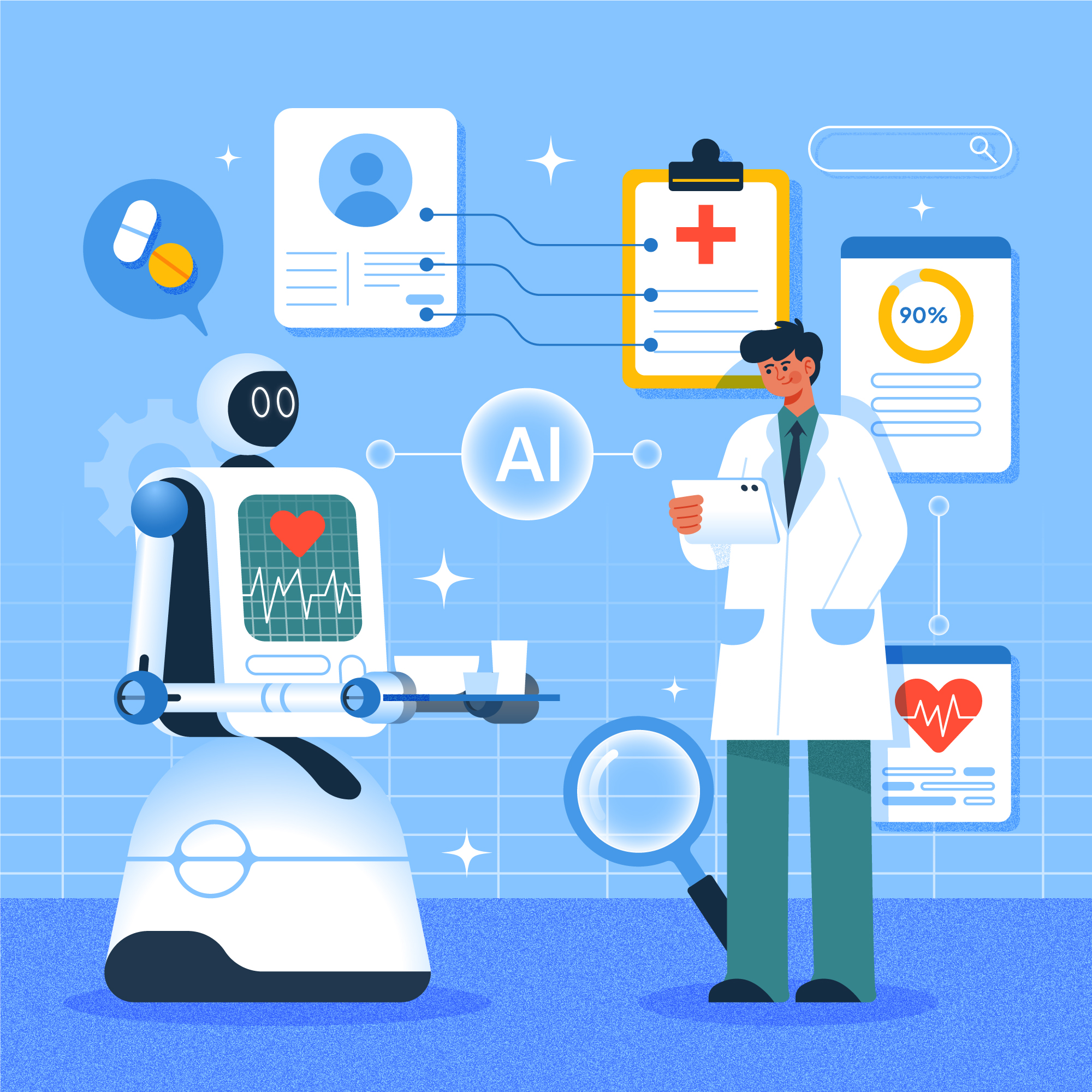The Future Of Ai In Healthcare: Transforming Diagnosis And Treatment

Introduction:
In the last few years, artificial intelligence (AI) has changed how healthcare works. It helps doctors diagnose diseases better and plan treatments that fit each patient. This article talks about how AI is shaping the future of healthcare, especially in diagnosing and treating illnesses.
AI Helps Diagnose:
AI is like a super-smart assistant for doctors. It looks at tons of medical data—like patient records and test results—to find patterns and clues. For example, AI can scan X-rays and MRIs to spot problems like cancer or brain issues faster and more accurately than humans. This quick and accurate help can lead to better treatment and more lives saved.
Personalized Treatment Plans:
Every person is different, and AI can understand that. By looking at a patient's genes, history, and lifestyle, AI can suggest treatments that fit them perfectly. This is called precision medicine. For example, AI can help cancer doctors choose the best drugs for each patient based on their unique body and cancer type. It's like having a tailor-made treatment plan just for you, which can mean fewer side effects and better results.
Better Decision-Making:
AI is like a smart assistant that helps doctors make decisions. It can read lots of medical papers and patient records quickly to find useful information. This helps doctors stay up-to-date on the latest research and make better choices for their patients. Also, AI can predict when a patient might get sicker, so doctors can act fast to prevent problems. By using AI, hospitals can work better and keep patients safer.
Challenges and Things to Think About:
While AI is exciting, there are things we need to be careful about. Keeping patient information safe and using AI fairly is very important. Also, we need rules to make sure AI in healthcare is safe and does what it's supposed to do. Plus, we need to make sure AI doesn't make decisions based on wrong or biased information. These are big challenges, but if we work together, we can solve them.
How AI Diagnoses Diseases Faster:
AI looks at lots of medical information quickly to help doctors find patterns and clues. For example, it can scan X-rays and MRIs to spot problems like cancer or brain issues better than humans. This helps doctors start treatment faster, which can save lives.
Tailored Treatment Plans with AI:
Everybody is different, and AI understands that. By looking at things like a person's genes and medical history, AI can suggest treatments that are just right for them. This is called precision medicine. For example, AI can help cancer doctors choose the best drugs for each patient based on their unique body and cancer type. This means fewer side effects and better results.

AI Assisting Doctors in Making Better Decisions:
AI is like a smart helper for doctors. It reads a lot of medical papers and patient records quickly to find useful information. This helps doctors keep up with the latest research and make better choices for their patients. Also, AI can predict when a patient might get sicker, so doctors can act fast to prevent problems. By using AI, hospitals can work better and keep patients safer.
Challenges in Using AI in Healthcare:
Even though AI is great, there are things we need to be careful about. Keeping patient information safe and using AI fairly are very important. Also, we need rules to make sure AI in healthcare is safe and does what it's supposed to do. Plus, we need to make sure AI doesn't make decisions based on wrong or biased information. These are big challenges, but if we work together, we can solve them.

The Future of AI in Healthcare:
Looking ahead, AI is set to keep changing healthcare for the better. It will help doctors diagnose diseases faster, create treatment plans that fit each person perfectly, and make hospitals run smoother. But to make sure AI keeps helping, we need to keep working on keeping patient data safe, making sure AI is fair, and solving any problems that come up. By doing this, we can make sure everyone gets the best healthcare possible.
Conclusion:
AI is changing healthcare for the better. It helps doctors diagnose diseases faster, plan treatments that fit patients perfectly, and make smarter decisions. But we need to be careful. We must protect patients' privacy, make sure AI is used safely, and make sure it doesn't act unfairly. By doing this, we can make sure AI continues to improve healthcare for everyone.
Some Useful Sources To Learn More
Article: Decoding Dna: How Computers Help Scientists Understand Genes
Here are some highly-rated books on the topic of AI in healthcare:
-
"Deep Medicine: How Artificial Intelligence Can Make Healthcare Human Again" by Eric Topol
- This book explores the transformative potential of AI in healthcare, emphasizing its role in restoring the human touch to medicine. Topol discusses how AI can improve diagnosis, treatment, and patient care while addressing ethical considerations.
-
"The Fourth Industrial Revolution" by Klaus Schwab
- While not solely focused on healthcare, this book by World Economic Forum Founder Klaus Schwab provides valuable insights into the broader impact of AI and other technologies on society, including healthcare.
-
"Machine Learning and AI for Healthcare: Big Data for Improved Health Outcomes" by Arjun Panesar
- Panesar's book focuses on the intersection of machine learning, big data, and healthcare. It explores how AI technologies can leverage vast amounts of healthcare data to improve patient outcomes, enhance clinical decision-making, and drive innovation in healthcare delivery.
These books offer valuable insights into the current state and future potential of AI in healthcare, making them essential reads for anyone interested in the intersection of technology and medicine.